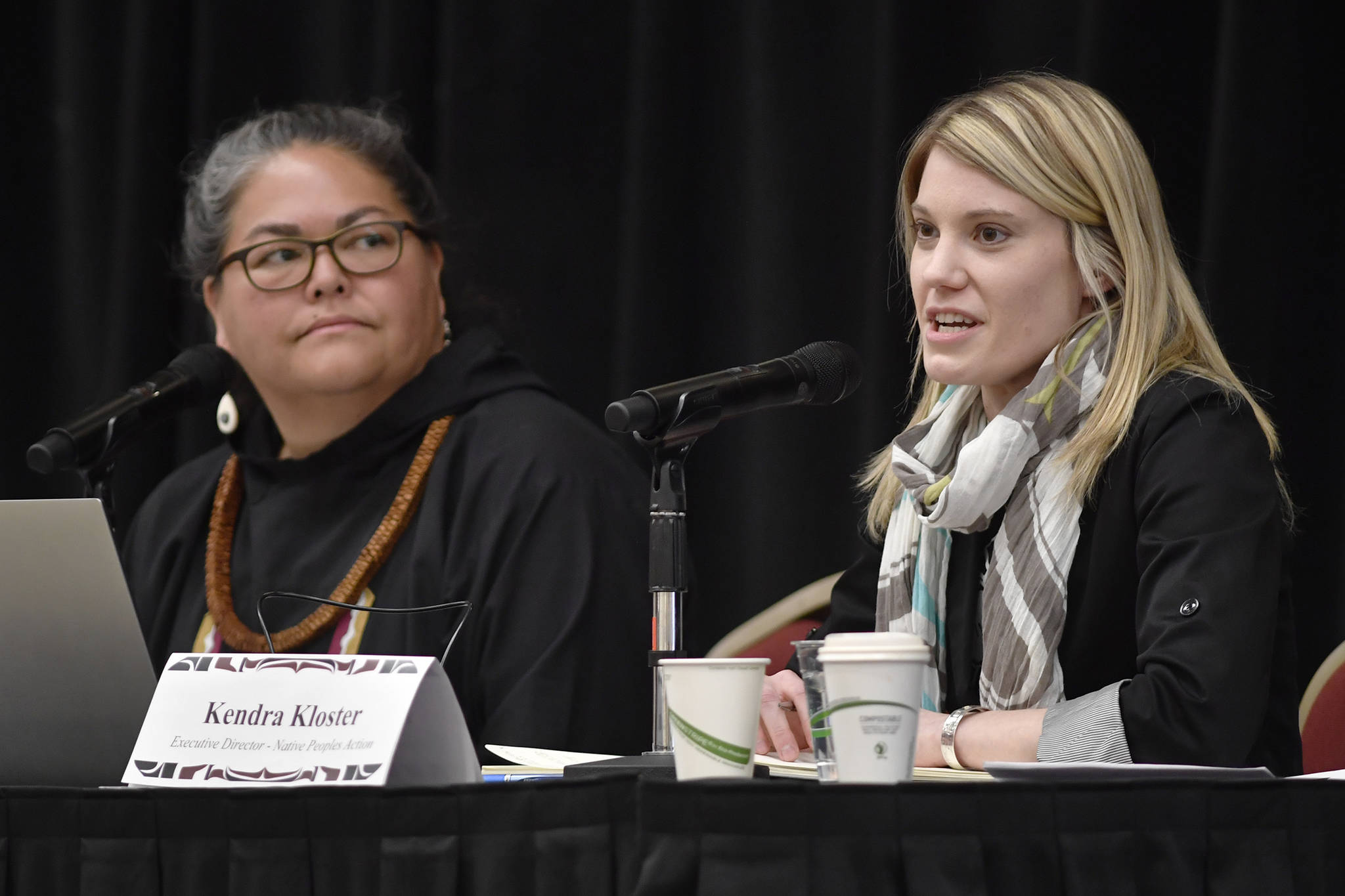Proposing a budget is just one step in the budget making process, and Liz Medicine Crow and Kendra Kloster want to make sure Alaska Natives help shape Gov. Mike Dunleavy’s proposed budget as it takes its ultimate form.
Medicine Crow, President and CEO for First Alaskans Institute, and Kloster, Executive Director for Native Peoples Action, were guest speakers at a Native Issues Forum Wednesday and urged those in attendance to pay attention to proposed budget cuts, be mindful of how communities will be impacted and be willing to share their stories with state lawmakers.
“If this really is just a conversation starter, then let’s not let that be a conversation that’s one sided,” Medicine Crow said. “This is a proposal, and the Legislature has to do the duty of vetting this proposal and hearing from the citizens of this state and that means we need to really show up. If the plate and the door is open for proposals, let’s put our own bold proposals forward.”
Medicine Crow and Kloster did not drill in on one particular topic, but instead provided an overview of the budget’s $1 billion in proposed cuts for the audience in Juneau’s Elizabeth Peratrovich Hall. Kloster said with so many areas on the chopping block, it’s important for people to find the ways the proposed budget could affect them and share their story with lawmakers.
Both speakers shared ways the proposed budget could impact their lives.
Medicine Crow said she has an aunt who cannot fly but needs to travel to receive medical care, so she is wary of reduced funding for the Alaska Marine Highway System.
[Governor proposes cutting ferry funding]
“If there’s no ferry for her to catch, how is she going to access the kind of medical care she needs?” Medicine Crow asked.
Kloster said she’s personally keeping an eye on education funding because she has a daughter who is about to enter preschool and will soon be working her way through the public school system.
“We’re looking at catastrophic cuts to education,” Kloster said. “Being a parent and having a 3-year-old, going through and realizing there’s no pre-K funding and looking at classroom sizes that could be 40 or more, and it’s just not the kind of education system I want to see for Alaska.”
[Senate finance grills Office of Management and Budget and Education Commisioner]
Additionally, the two talked about proposals that could send up to 500 inmates out of state, and reduce spending on health and social services, senior citizen services and rural support.
Less spending on rural communities would disproportionately affect Alaska Native villages, Medicine Crow said.
Kloster and Medicine Crow particularly highlighted a proposal that would allow the general fund to absorb the Power Cost Equalization fund, which helps subsidize the cost of power for residents of rural communities.
“Once they get it into that pool (the general fund), they get to decide however they want to spend it on whatever they want to spend it on, which means they don’t have to spend it on PCE,” Medicine Crow said.
Reduced spending on village public safety officers was also discussed.
“Our communities across Alaska deserve equitable public safety, and we haven’t had it,” Medicine Crow said. “To see a proposal that cuts our VPSO program more than it already has been is troubling and concerning, and it signals to us we have a lot more education to do in this area, so people understand that when you cut our VPSO program you’re going to further cause harm to rural Alaska.”
[Details emerge on proposed job cuts]
During a brief question and answer section after about 40 minutes of talking, some audience members shared their concerns, too.
Melanie Brown, a Juneau resident whose ancestry goes back to Bristol Bay, said a proposal to landing and business taxes on fisheries away from cities and boroughs stands out to her.
“It just made my mind explode with a picture of my mother’s home community just dying,” Brown said.
She questioned why Alaska does not have an income tax and said she understood it may be cumbersome for many, but often times mining, oil and tourism industry employees are taking income out of the state.
“We as Alaskans have to realize how much income leaves our state,” Brown said.
Mary Marks, a Juneau resident, said she was troubled by the proposed budget — specifically cuts to education funding — and encouraged Tlingit, Haida and Tsimshian people to unify in the face of whatever challenges may come up.
“It should cause us to come together as a unified Alaska Native people,” Marks said. “This is an opportunity to really voice our concerns and stand firm because our education is important, our ferry system is important, our tribal resources are important to us.”
• Contact arts and culture reporter Ben Hohenstatt at (907)523-2243 or bhohenstatt@juneauempire.com. Follow him on Twitter @BenHohenstatt.

